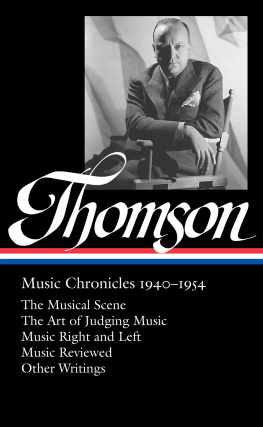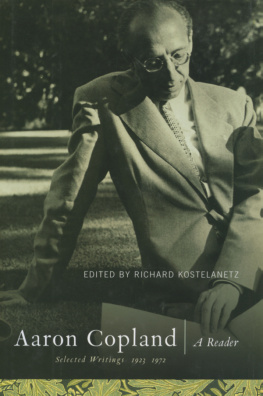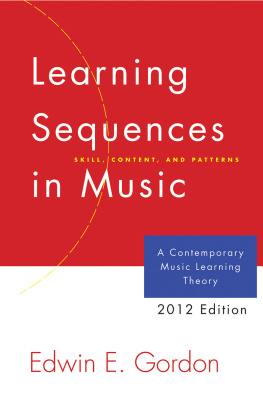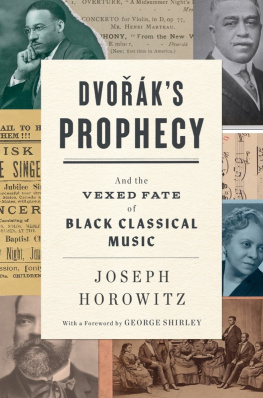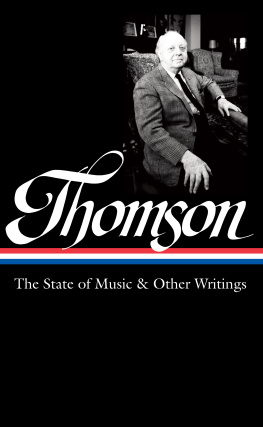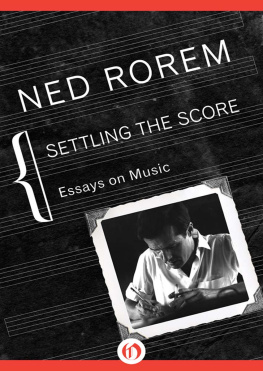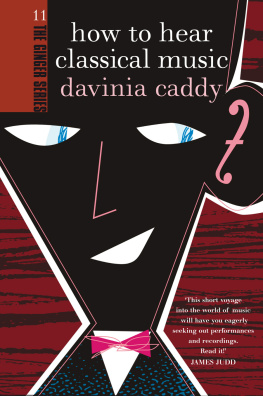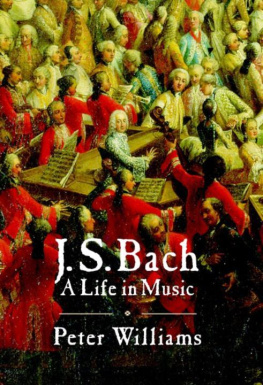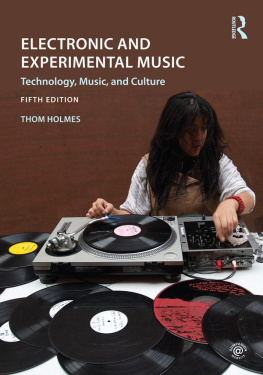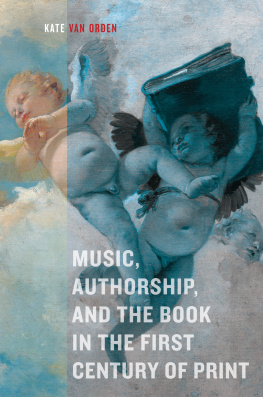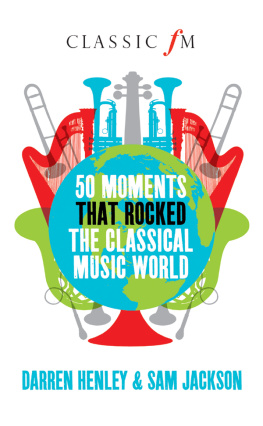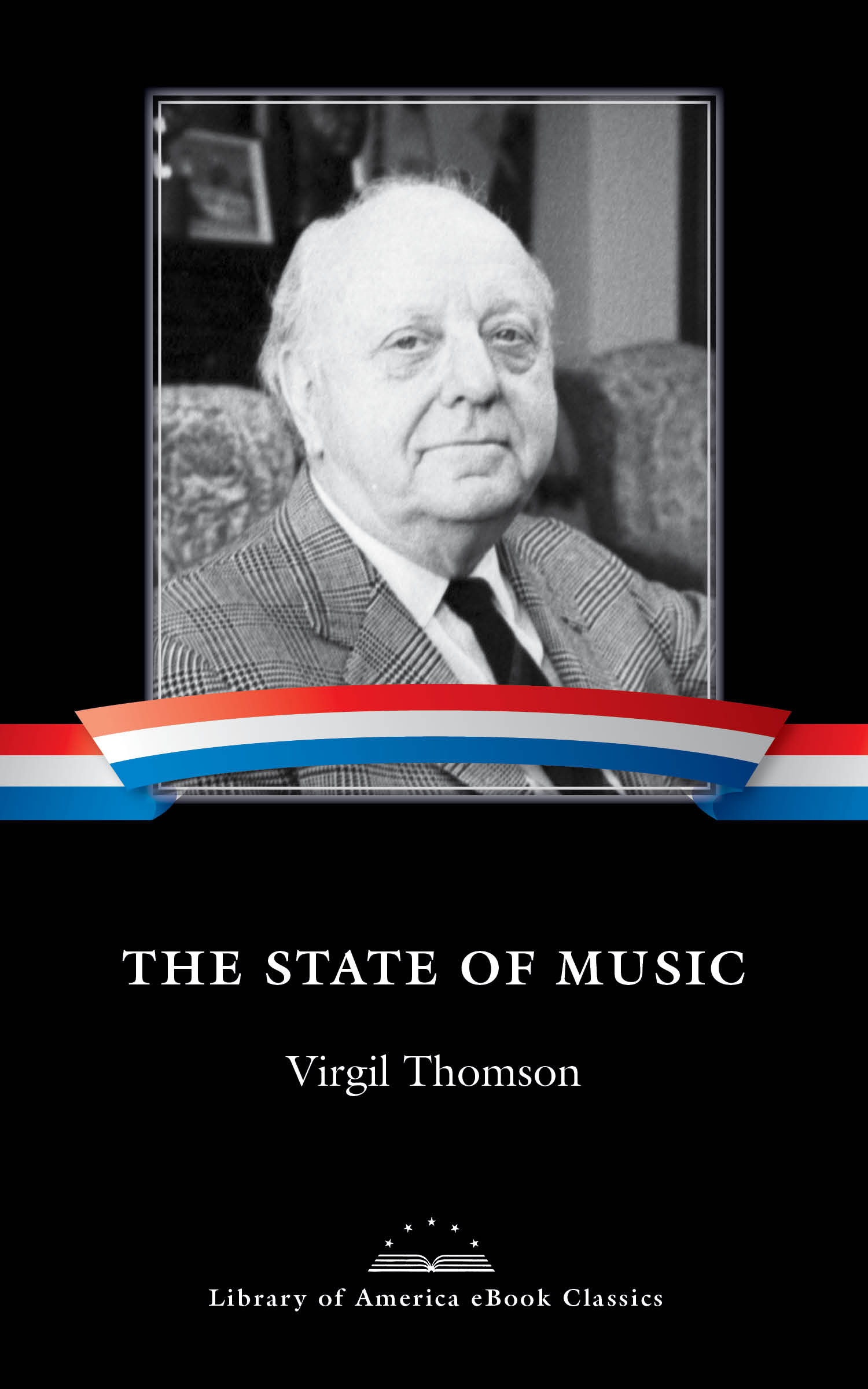
Library of America, a nonprofit organization,
champions our nations cultural heritage
by publishing Americas greatest writing in
authoritative new editions and providing resources
for readers to explore this rich, living legacy.
V IRGIL T HOMSON
THE STATE OF MUSIC
Tim Page, editor

LIBRARY OF AMERICA E-BOOK CLASSICS
Notes and chronology copyright 2016
by Literary Classics of the United States, Inc., New York, N.Y.
All rights reserved.
No part of this book may be reproduced in any manner whatsoever
without the permission of the publisher, except in the case of brief
quotations embodied in critical articles and reviews.
Texts by Virgil Thomson copyright 2016
by Virgil Thomson Foundation, Ltd.
Distributed to the trade in the United States
by Penguin Random House Inc.
and in Canada by Penguin Random House Canada Ltd.
LIBRARY OF AMERICA, a nonprofit publisher, is dedicated to publishing, and keeping in print, authoritative editions of Americas best and most significant writing. Each year the Library adds new volumes to its collection of essential works by Americas foremost novelists, poets, essayists, journalists, and statesmen.
Visit our website at www.loa.org to find out more about Library of America and to explore our popular Story of the Week and Moviegoer features.
Library of Congress Control Number: 2015935696
eISBN 9781598534757
Virgil Thomson:
The State of Music & Other Writings
is published with support from the
VIRGIL THOMSON FOUNDATION, LTD.
Contents
THE STATE OF MUSIC
Contents
1
Our Island Home, OR
What it feels like to be a musician
2
The Neighbors, OR
Chiefly about painters and painting
3
Survivals of an Earlier Civilization, OR
Shades of poets dead and gone
4
Life among the Natives, OR
Musical habits and customs
5
Life in the Big City, OR
The civil status of musicians
6
How Composers Eat, OR
Who does what to whom and who gets paid
7
Why Composers Write How, OR
The economic determinism of musical style
8
Composers Politics, OR
Professional bodies versus the secular state
9
Intellectual Freedom, OR
What can and cannot be censored
10
How to Write a Piece, OR
Functional design in music
11
Back to the Womb, James, OR
How modern music gets that way
12
Back to Politics, OR
How to run an island civilization
A 1961 Preface
T HIS BOOK was written in 1939. By November of that year, when it was issued, Europe was in armed conflict. The two decades that have passed since then have witnessed a world war, the deliberate murder of millions, the substitution for the customary class warfare of an international economic war called cold, a stabilization of trade-union privilege at the highest level ever known, the partition of Germany, the isolation of China. The last decade has encountered too a revolt of the colonial peoples, and undergone in Europe and America a prosperity boom.
Music during this time, save for a certain broadening of its distribution, has changed little. That is why it has been possible to envisage reprinting now a book depicting its state twenty years back. For music as an art evolves ever so slowly; and even its business is conservative, resistant to change.
Mostly what has changed in twenty years is the economic and political background. These changes, however, are so tremendous that almost everybody under thirty-five is dazzled by them, unable to see through them or around them, tends in consequence to view todays world of art as also full of novelty.
It is not necessary, of course, that young people have a great knowledge of history. A belief in their own time is far more useful. But when we see them, as we do today in music, painting, and poetry, mistaking for deep originality and for invention diluted versions of our centurys earlier masters (who really were radical), then one does feel moved to remind them that we too, when young, had an intellectual life and that an inflated market is merely an inflated market.
This book is completely out of date as regards fees, art prices, and the cost of living. It describes, on the contrary, a world that had suffered for ten years from monetary depression. During those years, especially after Germany had sacrificed both personal and religious freedom to a controlled economy, the West went liberal. At least the Popular Front in France and the New Deal in America represented an effort to redefine wealth so as to include working power and to give this power a protection comparable to that constitutionally accorded to real property.
The book is constantly preoccupied, in consequence, as indeed we all were in those days, with establishing a practical basis for demanding and obtaining, as musicians, a voice in the directing of musics affairs. We no longer believed in the disinterestedness of the amateurs and the businessmen who were still trying to administer our properties when they couldnt even handle their own.
That aspect of the book is not out of date at all. Indeed the recall of such reflections can be useful against the time when some other crisis, economic or political, may force the workers in arttodays young or tomorrowsto rise from their beds of ease. The outer world is moving fast, but art is a permanent value. And if the makers of art do not claim as a permanent right their intellectual privileges and just emoluments, nobody will do it for them. Quite the contrary, unless they watch out very carefully, some church, some state, some business combine will be running their lives. And it should not be so. I do not myself believe today will last; but whether it lasts or not, all should be ready for change and for taking advantage of it.
It is because I find the esthetic and the economico-political aspects of the book so largely valid still that I do not feel impelled to write another version of it, a 1960 version. Its quality and its nature are of 1939. The young peopleand I do hope they will read itmay be shocked at how much we cared, and surprised at our thinking we could change anything. But that is exactly the point; we could and did. Before World War II individual people actually could change things or get them changed. Since that time private and small-group actions have become more hazardous. This is the secret canker at the heart of todays young. And nothing can be done about it. But life was better, even without money, when fear was not there.
Among the artistic professions discussed in this book, the one least altered in twenty years is that of poetry. England and France, I should say, are suffering, though perhaps only temporarily, a diminution of its flow. The United States goes right on producing the chief contributions to English-language poetry, just as South America does for Spanish. Germany, though inactive now, has seen fulfilled in life and closed by death the career of Bertolt Brecht, a rare one for our century in that Brecht was both a dramatic poet and a political poet of the left, in a time when few poets have been gifted for the stage and when most of the finer ones have traveled with the right in politics.


